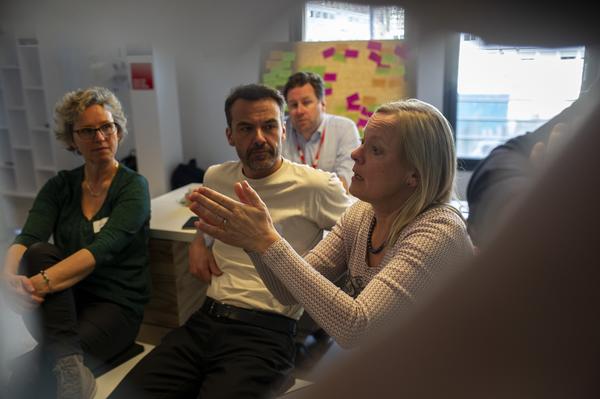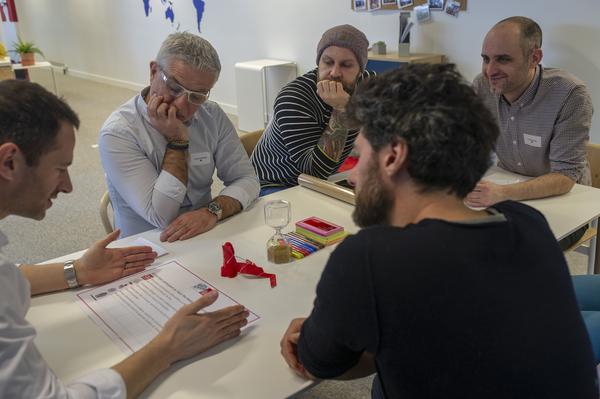We use cookies to optimise the design and performance of our websites. By continuing to browse this website, you agree to the use of cookies. Find out more about our cookies and how we use them.
Workplace Well-being and Collective Performance through Mindfulness
26 APRIL 2019
Over the past few decades, everything has accelerated and become urgent, with a constant demand for ever more and ever better, and this in a minute.Â
Executives, managers and employees are constantly in the race for performance and excellence. High turnovers, more and more slashers, overwork, exhaustion, burnouts, borouts... These evils have ended up damaging the world of work and our entire society.
Well-being at work is now a central issue in companies that are increasingly concerned with the development of their employees. Relaxation sessions, massages, hypnosis, yoga and other relaxation techniques are now regularly invited to our organizations, which are overwhelmed by their own ways of working.
A simple psychological concept, not really revolutionary, but very effective in learning to slow down and reconnect with your Human is now very popular. A practice that intrigues by the results it promises and challenges by its simplicity and its vast fields of application and action. This is mindfullness.
What is Mindfulness ?
This psychotherapeutic technique - nowadays considered the most studied worldwide - allows one to intentionally focus on the present moment, moment after moment, in an attitude of acceptance and non-judgment.
It is therefore a question of "watching" one's thoughts and emotions pass by with a certain distance, a voluntary detachment allowing one to accept what is without letting oneself be caught up in the flow.
The practice of mindfulness thus requires 4 specific meditative skills:
- A fully conscious presence in the here and now,
- The conscious and conscientious observation of what is happening around us AND within us (noises, smells, colours, shapes, thoughts, emotions, feelings...),
- The acceptance of the present moment (here and now), the acceptance of emotions and feelings without judgment of any kind,
- The neutral observation of the experiment.
- Considerably used in behavioural therapy where it works miracles, mindfullness is of great interest today to the world of work, which, thanks to it, could well recover its soul.
How to become an enlightened manager?
A manager practicing mindfullness will be more aware of his work functioning, but also more able to listen fully to his employees and show kindness in the management of his troops. He will be able to build a climate of trust within his team, open dialogue and exchanges in a fluid and constructive manner. In short, be an inspiring leader!
In his daily management, the regular practice of mindfulness allows the manager to:
- Significantly reduce stress and improve concentration
- Develop emotional intelligence
- Promote cooperation
- Understand change more effectively
These 4 elements are pillars of the managerial posture.... Acting on these levers is a guarantee of success for today's manager and his entire team.
Â
Stress reduction
By inviting us to step back from our automatic reflexions, mindfullness helps to break the vicious circle of negative thoughts induced in stressful or delicate situations. Moreover, by anchoring us in the present moment, it allows us to take the distance and emotional detachment necessary for a more peaceful management of events.
The manager will be able to control his stress and will avoid not only passing it on to his employees, but also letting himself be contaminated by theirs, which will result in a general appeasement.
In addition, through regular meditation and anchoring exercises, he will work on his ability to focus on a particular task, thus increasing his effectiveness.
Awakened management of emotions
The regular practice of mindfulness fundamentally changes the way we react to a particular behaviour, especially when it is negative. It allows us to better identify negative and toxic thoughts and ruminations that drive us down and dictate an aggressive or at least inadequate posture in a delicate situation. Becoming aware of this leads to a new and more neutral perspective.
Awareness of our emotions also leads us to show greater empathy towards our fellow human beings, because it allows us to better understand how we and others work. This greatly improves interpersonal relationships, fluid communication and natural and respectful exchanges.
Thanks to mindfulness, the manager will be able to avoid reacting quickly and be more lucid and objective in the face of a tense or difficult situation. This will enable him to make effective decisions and act appropriately and fairly on a daily basis.
Valuing cooperation
Mindfullness improves the quality of interpersonal relationships, thereby promoting a predisposition to collaboration and cooperation between individuals. Indeed, it induces an attentive listening, without hasty judgments. Communication is positive and more fluid, opening the door to regular feedback within the group and constructive exchanges.
Moreover, the increased awareness of our mode of functioning pushes us to analyze and understand that of the people we meet. This allows us to adapt our communication and management style and interact more effectively.
By promoting well-being at work, benevolence and trust within his team, the manager thus stimulates motivation and collective intelligence.
Effective change management
Regular mindfulness exercises offer the ability to instantly take a step back from what is happening. This avoids, for example, decisions taken too quickly under the influence of emotion or pressure.
Mindfullness broadens the vision of those who practice it regularly. It increases empathy tenfold, strengthens self-confidence and skills, and significantly increases adaptability and flexibility.
In this way, the enlightened manager will be able to approach change in a more serene way. He will be able to present it to his employees and manage resistance effectively, taking into account all the human dimensions affected by it.
The manager who integrates mindfulness into his management puts the human being at the heart of his practices and thus magnifies his leadership.
The experience is appealing to you? emlyon business school offers a complete program that will allow you to use mindfullness to enhance the collective performance of your team.
Article written by R. Grangé in partnership with the blog Manager Go!



